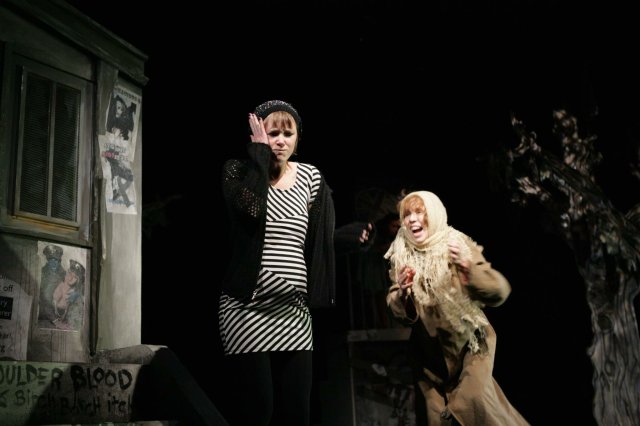
We don’t believe in fairies. Even after jettisoning the cute and ethereal versions we’re too civilized to take such things seriously (outside the state of Maine). Even Harry Potter discovered that The Grim was more tale than tail. Yet strange things happen without apparent cause. People suddenly grow wan and disheartened. They may do terrible things and turn on those they love most. How do we explain this and if those who are changed blame something fantastic beyond themselves how do we explain that?
The juxtaposition of real and fantastic is a driving force in Caryl Churchill’s The Skriker currently playing through November 11 in a Janice Findley production at Erickson Theatre (tickets). Much of the action in this play can come from an intellectual distance the audience experiences in the face of horrors implied and threatened on the stage, a distance we try to bridge in justifying the fantastic by our own sense of the real. Director Janice Findley and her talented company assist us by conjuring a phantasmagorical evening (that feels longer than it should).
Though rarely produced elsewhere, The Skriker seems a relative Seattle favorite, playing in a Ghostlight Theatricals production just last year. This fantasia of horrors centers on the friendship of two young single mothers, Lily and Josie (Jessica Martin and Mariel Neto). These working class women struggle with powerful forces that pit empathy against humanity with their souls and babies at stake. The antagonist in all this is a skriker, a shape-shifting mythological creature of Yorkshire and Lancashire associated with changelings and portents of death. In Churchill’s depiction the Skriker is a being who lives to sow misery by a dangerous magic bound with wishes and feeding on misplaced affection.
The play begins with a lengthy monologue from Mary Ewald as the title character. Ewald knows something about lengthy monologues as evinced by her recent performance in the New City Theatre’s production of Beckett’s Happy Days. Here Ewald’s skilled performance keeps the hallucinatory exposition alive for the most part, which is no mean feat.
The Skriker’s language is a slurring babble of related sounds and ideas swirling around the thrust of each sentence like whirlpools cast off the blade of an oar. In carefully conveying each element in that yabbering, Ewald slows what could be a rush of double-speak into a litany that drags the speech down and sets show’s sluggish tempo.
That plodding pace is most noticeable in the real world scenes as Josie and Lily fight to rid themselves of the skriker. These scenes risk seeming repetitive, just variations on a theme with Ewald dressed up in a series of disguises. This production finds no arc in these scenes and the attraction that Lily and Josie feel for the skriker is mystifying.
Overall the fantasy tends to work better than the real aspects. This is especially true of Eve Cohen’s costumes. Cohen captures the Essex-girl aesthetic with accuracy that is more horrifying than any of the fantasy creatures. Unfortunately her pregnant dress for Lily doesn’t help Martin’s unconvincing physical work.
The dance ensemble breathes life into their costumes from Christian Swenson’s poised Kelpie to Sruti Desai’s panting and patient Black Dog. Swenson and Swartzman nearly steal the show as the Blue Men of a beach scene (disconnected from the rest of the show by excessively long scene changes). The beach scene transitions are the low point of a disappointing second half in which blackouts drag on with soft music and loud shuffling. The first half’s transitions are precise and smooth with the world of fantasy and mythology overrunning that of Josie and Lily and then receding to reveal a new setting. The script is written without an act break and this production’s intermission feels out of place and abrupt.
The highlight of the show is a banquet in which choreographer Pat Graney’s dancers are let loose around a table full of revolting food. Paul Hansen’s fine sound design has some of its best achievements here as Esmé De Coster’s Lost Girl attempts to ward Josie from her doom. Hansen’s compositions with their layered references heighten the scene to a level that suggests the entire show might benefit from more singing.
Of all the successes in the show, and there are many, the most impressive is in the lighting and set design. Timothy Siciliano and Amiya Brown’s simple, spare staging and moody green-heavy lighting constantly surprise and never fail to unnerve. One wishes they had either a more intimate setting or a budget that permitted more expansive staging including more dancers, but under the circumstances The Skriker is an aesthetic triumph. It casts a chill that audiences will be hard-pressed to shake.